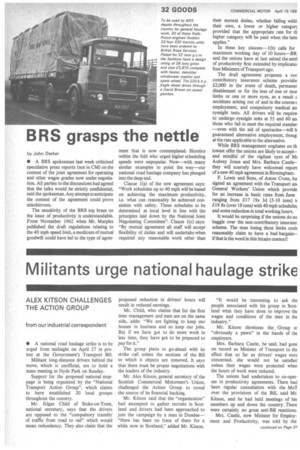BRS grasps the nettle
Page 34

If you've noticed an error in this article please click here to report it so we can fix it.
by John Darker • A BRS spokesman last week criticized speculative press reports (not in CM) on the content of the joint agreement for operating and other wages grades now under negotiation. All parties to the discussions had agreed that the talks would be strictly confidential, said the spokesman. Any attempt toanticipate the content of the agreement could prove mischievous.
The sensitivity of the BRS top brass on the issue of productivity is understandable. From November 1962 when Mr. Marples published the draft regulations relating to the 40 mph speed limit, a modicum of mutual goodwill could have led to the type of agree ment that is now contemplated. Heretics within the fold who urged higher scheduling speeds were unpopular. Now—with many similar examples to point the way—our national road haulage company has plunged into the deep end.
Clause 1(a) of the new agreement says: "Work schedules up to 40 mph will be based on achieving the maximum productivity, i.e. what can reasonably be achieved consistent with safety. These schedules to be determined at local level in line with the principles laid down by the National Joint Negotiating Committee". Clause 1(c) says: "By mutual agreement all staff will accept flexibility of duties and will undertake when required any reasonable work other than their normal duties, whether falling withi their own, a lower or higher categor3 provided that the appropriate rate for th higher category will be paid when the latte applies."
In these key clauses-1(b) calls for maximum working day of 10 hours—BR, and the unions have at last seized the nettl of productivity first extended by implicatio four Ministers of Transport ago.
The draft agreement proposes a nor contributory insurance scheme providin £2,000 in the event of death, permaner disablement or for the loss of one or mar limbs or one or more eyes, as a result c accidents arising out of and in the course c employment, and compulsory medical an eyesight tests. All drivers will be require to undergo eyesight tests at 55 and 60 an those who fail to meet the required standar, —even with the aid of spectacles—will b guaranteed alternative employment, thougl at the rate applicable to the alternative.
While BRS management cogitates on th lowest offer the unions are likely to accept— and mindful of the vigilant eyes of Mt Aubrey Jones and Mrs. Barbara Castle— they will scarcely have welcomed report of a new 40 mph agreement in Birmingham.
F. Lewis and Sons, of Aston Cross, ha signed an agreement with the Transport am General Workers' Union which provide for an increase in basic rates from June ranging from £17 19s 3d (5-10 tons) ti £19 8s (over 18 tons) with 40 mph schedulini and some reduction in total working hours.
It would be surprising if the unions do no haggle over the non-contributory insuranc, scheme. The man losing three limbs coult reasonably claim to have a bad bargain— if that is the word in this bizaire context!








































































































































